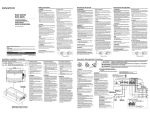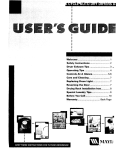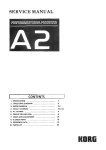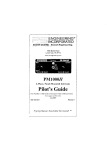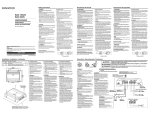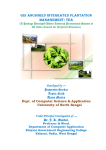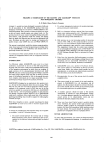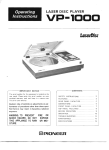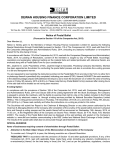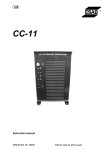Download Kenwood AT-130 Car Stereo System User Manual
Transcript
FEATURES The Model AT-130 is designed to satisfy your antenna-tuning requirements. It has been manufactured with the quality and performance that makes Kenwood "The Pacesetter in Amateur Radio". This unit has been carefully engineered and manufactured under rigid quality standards, and should give you satisfactory and dependable operation for many years. Should any trouble arise with this unit, please contact the authorized KENWOOD dealer from whom you purchased the item. AFTER UNPACKING Shipping Container: Save the boxes and packing in the event your unit needs to be transported for remote operation, maihtenance, or service. The following explicit definitions apply in this manual. NOTE: If disregarded, inconvenience only. No risk of equipment damage or personal injury. CAUTION: Equipment damage may occur, but not personal injury. 1. The AT-130 is a high performance H F antenna tuner and is a modification of the popular AT-200 antenna tuner. The AT-130 is sma!l and light, and is suitable not only for operation in your HAM shack but also for mobile or field operation. 2. The AT-130 consists of an antenna coupler, an SWR meter, and an antenna switch. 3. The AT-130 is designed to be used on the Amateur bands between 3.5 MHz and 30 MHz. 4. Antenna MATCHING or THROUGH operation is BAND-switch selected. 5. The SWR meter operates in both THROUGH and MATCHING modes. 6. A mounting bracket is included for mobile operation. 7. The panel meter can be illuminated by an external power source. 8. The antenna matching circuit is also effective in reducing TVI since it acts as a band-pass CONTENTS AT-130 Specificat ions . . . . . . . . . . . . . . . . 3 Section 1. Preparation for Use . . . . . . . . . . 4 Section 2. Controls and their functions . . . . 5 Section 3. Operation . . . . . . . . . . . . . . . .6 Section 4. Circuit Description . . . . . . . . . . 9 Section 5. Additional Information . . . . . 10 Schematic Diagram . . . . . . . . . . . . . . . . . 1 1 w (,,PIL-~) w w 691 -a (1,9) wwz91 'M (,,8/&-Z) ww09 'H pnls pue lnu 6 u ! ~ ( ~ 0 )adAl 4 dHfl (U09)adAljHfl .y3$ew wnw!ldo l e g p 5.0 ueyl ssa1 ( M OZ 1 'Pueq ZH W 4'&) 'Xew M 0s 1 'pa3uelequn ' uoo& 01 02 004 ZH W L'6Z 01 S'E w o spueq ~ ~ ~na~ewe.8 Accessories: Carefully unpack your AT-130 Antenna Tuner and verify the following accessories are included. * Operating manual . . 1 copy * Mounting bracket (J29-0402-02) 1 piece * Mounting hardware Screw, 4 mm diameter . 4 pieces Flat washer, 4 mm diameter . 4 pieces Lock washer, 4 mm diameter . 4 pieces Nut, 4 mm diameter . . . 4 pieces Wing Bolt, 4 mm diameter (~09-0007-05) . . 4 pieces 4 pieces . . Polyethylene washer * 2P power plug (~09-0203-25). . . 1 piece * Ground lug (~23-0015-04).. . . 1 piece .. .. ... .. . .. ... . . . ... . . . .. .. . .. Interconnection Cable To connect your AT-130 with the TS-130S(V). or other transceiver, an interconnection cable is required. Refer to Figure1-1 for details. - Meter Lamp Power (Figure 1-21 Power for the meter lamp i s supplied from an external power source. Use the supplied 2 PIN plug for power-supply connection. Observe polarity. Cut end of cable even. Using a sharp knife or razor, score and remove the sheath - Don't cut the braid. I Slide the coupling over the cable, and carefully solder the connector. Make certain the insulation is not melted by Figure 1-2. Meter Light Power Connection 1 !- SECTION 2. CONTROLS AND THEIR FUNCTIONS -I JIIIII~~IIIII~~~~~~I~~IIIII~~IIIII~~IIII~~~IIIII~~IIIII~~IIIII~~IIIII~~IIIII~~IIIII~~IIII~~~IIIII*~IIIII~IIIIII~~IIIII-~ ~~~~~~~~~~~~~~~~~~~I~-~IIII~.~IIII~~~IIII~.~~III~.~IIII~~~IIII~.~IIII~.~IIII~.~IIII~.~II~I~.~IIII~. PULL LAMP rI 71 ANTENNA TUNER AT- 130 r 71 Figure 2-1 Front view 1. Meter The meter reads SWR (standing-wave ratio) and may be illuminated by an external power source. 2. CAL (Calibrate)/SWR Switch To measure SWR, first set this switch to the ) Adjust the CAL control until CAL (1position. the meter pointer swings to the CAL line on the meter scale. position, Then depress the switch to the SWR (1) and read the SWR. 3. CAL (Calibrate) ControlIMeter Lamp Switch Before measuring SWR, this control is used to calibrate the meter. Adjust as described above in item 2. The meter lamp lights when the control is pulled ON. 4. BAND Switch Set this switch to the band in which you are operating. The BAND switch also has a "THROUGH" position at which the antenna i s connected directly to the transceiver. SWR can also be measured a t the THROUGH position. CAUTION: DO NOT operate the band switch while transmitting. Equipment damage WI L L occur. 5. R TUNE The R TUNE adjusts the resistive component of antenna impedance. 6. X TUNE (~ransmit~ u n i nControl ~) The X TUNE adjusts the reactive component of antenna impedance. Figure 2-2. Rear View 1. Serial No. Plate This plate is stamped with the Serial Number of your unit. 2. GND post Connect the GND post to the transceiver GND stud. Use as short a cable as possible, using the supplied ground lug. 3. 12V DC Accepts 12V DC for meter illumination. Use the supplied plug. NOTE: Viewed from the rear, the right terminal is POSITIVE. 4. INPUT Connector The INPUT UHF connector accepts the H F input signal fed from the antenna connector on the transceiver. 5. ANT Connector The ANT UHF connector accepts the antenna coaxial cable. b Measuring antenna system SWR (i) Using an all solid-state transceiver (such as a TS-130s or TS-130V) Before setting up the antenna coupler, first determine the antenna system SWR. a. Set the controls as shown in Figure3-2. Set the BAND switch to the "THROUGH" position. b. In the transmit mode, calibrate the meter with the calibration control. c. Depress the CALISWR switch to the SWR (1) position and read SWR. If the SWR is lower than 1.5: 1 the antenna system impedance i s sufficiently matched for practical use. If above 1.5: 1, tune the system. NOTE: In the event of too high an SWR (over 10: I), check the antenna system for breaks or a short circuit. (ii)Using a tube power amplifier transceiver (such as a TS-820) Connect the transceiver (or transmitter) and dummy load (or antenna) through the AT-130 as shown in Figure 3-3. Before adjusting the antenna coupler, you should first know the antenna system SWR. Connect the dummy load to the ANT connector and adjust the transceiver (or transmitter) final tuning. Then, replace the dummy load with the antenna and measure the antenna-systemSWR. NOTE: During antenna measurements, your transceiver may be operating under heavy loading conditions. Your signal may also interfere with other stations. Use the least amount of power possible, and complete measurements as quickly as possible. e l Coax. T , \ Ground lead Figure 3-1. Interconnection I: BAND R TUNE CAL @ PULL LAMP k ANTENNA 1 1 Switch out set CAL ( control Figure 3-2. Switch Settings 6 Table 3-1 shows approximate control positions for coupler adjustment. Adjusting the Antenna Coupler The antenna coupler is used to match a transmitter to an antenna system when i t s SWR is too high (i.e., greater than 1.5:1 SWR). a. Place the BAND switch to the same band setting as your transceiver (as shown in Figure 3-41, b. Set the CALISWR switch to the CAL ( I ) position. c. Transmit and adjust the CAL control so the meter indicates CAL. d. Place the CALISWR switch in the SWR) , ( position. e. Ncw you will measure the reflected power. Adjust the R TUNE and X TUNE controls alternately for a good minimum meter indication. Reflected power will be close to zero as a good match is achieved. Table 3-1 I BAND(MHz1 I I R TUNE I X TUNE - - -p - B. A N T System A. D u m m y load TS-820 o r other Transceiver --f 1 I Ii I I I19 M .- I .-a A T - 120 0 0 0 oo!l oooll II! - ~.- ANT 1 4- - - - 1l First tune u p o n A D u m m y load. Then check antenna SWR. _ .. necessary. r71 - -- Coax. INPUT Coax. G r o u n d Cable Figure 3-3. Inter Connection -Adjust alternately f o r m i n i m u m SWR reading. 4 R TUNE BAND PULL LAMP c .~ @ X TUNE ANTENNA TUNER AT- 130 Figure 3-4. .', . .- AT-130 Mobile Installation . Securely install the Mobile Mount using four lock washers, four flat washers, and four screws and nuts. Install the AT-130 in the Mobile Mount by four wing bolts and polyethylene washers. Adjust the tilt before tightening the bolts. Mounting bracket Figure 3-5. Mounting bracket Detail Figure 3-6. Adjusting the Mounting Angle Figure 11 shows a block diagram of the AT-130. Direcltional Coupler The directional coupler samples forward and reflected power from the transceiver to the load. Meter Circuit The forward and reflected power sampled by the directional coupler is used for SWR measurement. Forward power i s calibrated with the CAL control so reflected power is read as SWR. Band Selector Switch This selects the band to which the matching circuit is tuned. In the "THROUGH" position, Idthe antenna i s connected directly to the trans- ceiver, bypassing the coupler, while s t i l l allowing SWR measurement. Antenna Coupler The universal matching circuit is capable of matching 20 t o 300n loads to the 50a input impedance. 1 INPUT DIRECTIONAL COUPLER -c BAND SELEC---c TOR ANTENNA COUPLER I METER CIRCUIT @ ANT n GND Figure 4-1. AT-130 Block Diagram i 1. General lnformation Your AT-130 has been factory aligned and tested to specification before shipment. Under normal circumstances, it wili operate in accordance with these operating instructions. If your unit fails to work, contact the authorized dealer from which you purchased it for quick, reliable repair. Attempting service without factory authorization can void the unit's warranty. 2. Ordering Spare Parts When ordering replacement or spare parts for your equipment, be sure to specify the following: Model and serial number of your transceiver, Schematic number of the part. Printed circuit 3. Service You may return your unit for service either t o the Authorized Kenwood Dealer from whom you purchased it or to Trio-Kenwood. A copy of the service report will be returned with the unit. Please do not send sub-assemblies or printed circuit boards-send the complete unit, in i t s original boxes and packing. You need not return accessory items unless they are directly related t o the service problem. I f you want verification of receipt, please supply a self-addressed card (or letter) and we will inform you of the date of receipt and estimated service time. NOTE: When claiming warranty service, please include a photocopy of the bill of sale, or other proof of purchase showing the date of sale. Dear OM, if you desire to correspond on a technical or operational problem, please make your note short, complete, and t o the point. And PLEASE make it readable. Please list: Model and serial number. The question or problem you are having. Please give sufficient detail t o diagnose; other equipment in the station, meter readings and anything you feel might be useful in attempting diagnosis. T - w 4. Dial Lite lnformation B30-9996-00 Part # Rating 12V 40mA To replace: 1. Remove top cover. 2. Note position of all leads on S meter and lamp P.C.B. 3. Remove all leads from meter and lamp P.C.B. 4. Remove meter bracket. 5. Remove 2 brass Philips screws holding lamp P.C.B. to meter. 6. Swing P.C.B. rear edge up and out. 8. Reverse disassembly procedure. c 1 Circuits and specifications are subject to change for improvement. ~ [gcT SWR LAMP 12V Model : Serial AT-130 ......................................................................................................... Date Purchased..................................................... Dealer ........................... ........................................................................................................ A product of TRIO-KENWOOD CORPORATION 1715. 2-chorne. s h l b u y a . sh~buya-KU Tokyo 150. Japan TRIO-KENWOOO COMMUNlCAllONS 11 1 ) West Walnut Street Cornoton Calfornra 9 0 2 2 0 U S A TRIO-KENWOOO COMMUNICATIONS. GmbH D 6 3 7 4 Stelnbach TS lndustr~estrasse8 A West Germany TRIO-KENWOOD ELECTRONICS, N.V. Leuvensesteenweg 5 0 4 8 1 9 3 0 Zaventem B e l g ~ u m TRIO-KENWOOD [AUSTRALIA) PTY. LTD. 4 E Woodcock Place Lane Cove N S W 2066 Australla 0 2 5 3 0 9 P R I N T E D I N JAPAN 850-3928-08 (K.0)












